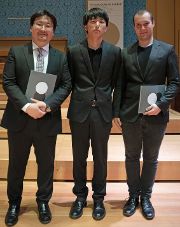Dreams become sounding reality in Geneva
Two of the three final compositions for vocal ensemble at the 76th Concours de Genève were inspired by dreams. The South Korean Shin Kim was awarded 1st prize.

Every two years, a composition competition is held as part of the Concours de Genève, which continues to enjoy a high international reputation despite the strong competition. This competition continues the tradition of the Prix International de Composition Musicale, which was established in 1959 by the Fondation Reine Marie José and is also financially supported by the latter.
97 candidates between the ages of 18 and 39 from 37 countries submitted their works for this year's edition. The requirement was a 15 to 20-minute work for a six-member vocal ensemble consisting of bass, baritone, tenor, mezzo-soprano, soprano and high soprano, whereby the mezzo-soprano could have been replaced by a countertenor. The use of electronics was also permitted under certain conditions.
As always, a high-caliber jury was engaged, this time consisting of the jury president Beat Furrer as well as Hans Abrahamsen, Unsuk Chin, Stefano Gervasoni and Isabel Mundry. Although the jury's professional competence is beyond any doubt, one may wonder whether all trends in contemporary music were actually adequately represented. From June 20 to 22, the jury members met at the Fondation Bodmer in Cologny to select the three finalists from the huge number of works submitted. It remains to be seen whether it is actually possible to select the three best works without having heard them.
Nevertheless, the audience could still look forward to an exciting finale, as the Neue Vocalsolisten from Stuttgart, a world-renowned top ensemble for new music, could be won as performers for the concert with the three works on October 26. The finalists were Hungarian-born 1995 Ármin Cservenák with Madrigali, the Japanese of the same age Yuki Nakahashi with Settings and the 1994 born Shin Kim from South Korea with The Song of Oneiroiin which microphones were also used (electronics: David Poissonnier).
From the mirror of the self to the tour de force
Madrigali by Ármin Cservenák is a four-movement composition on texts by Petrarch, Michelangelo and Giacinto Scelsi, which refers to Renaissance madrigals without quoting the compositions of the past. The music of the first and third parts is expressive, frequently interrupted by caesuras, dynamically very varied and utilizes the full range of the ensemble, while the other parts are composed in a more two-dimensional manner with cleverly used microtonality and noisy passages. The composer writes, Madrigali is a work about dreams and visions, dreaming is a state or place where the unconscious opens up to us and allows us to get to know ourselves better, like an honest mirror.
Ármin Cservenák, who studies with Beat Furrer in Graz, was awarded 3rd prize and the audience prize for his differentiated work, which in certain passages is reminiscent of role models such as Salvatore Sciarrino.
-

The three winners: From left: Shin Kim, Yuki Nakahashi, and Ármin Cservenák
Settings by Yuki Nakahashi, in some passages stylistically not so far removed from the first work of the evening, is overall a rather introverted piece in eight parts. The composer uses texts, structures and compositional techniques from cantatas by Johann Sebastian Bach, which are contrasted and overlaid by noisy sections. Many biblical animals populate the score, for example the bleating of the abandoned sheep can be heard almost naively. The fact that Yuki Nakahashi, who studied in Japan and Paris with Stefano Gervasoni, among others, also wrote the chorale Enough is enough! is no longer particularly original after the shattering effect this quote has in Alban Berg's Violin Concerto. The jury awarded the Japanese composer 2nd prize, and he also received no less than three special prizes.
The Song of Oneiroi does not set a text to music, but is based on the different timbres of syllables in different languages. In Greek mythology, the embodiment of dreams was called "Oneiroi". Shin Kim is a self-confident young composer who knows how to skillfully use all the ingredients for a successful piece. His work, a veritable tour de force, was clearly the most effective of the concert, with the use of microphones, clapping, stomping and body percussion also making it the most versatile in terms of sound. The composer obviously knows his way around contemporary vocal technique and does not shy away from dynamic extremes. Kim, who after studying in Seoul and Vienna is now studying with Rubens Askenar at the Royal Academy of Music in London, was awarded the first prize of 15,000 Swiss francs for his attractive work.
The three composers and the outstanding ensemble of soloists from Stuttgart were enthusiastically celebrated by the large audience in the magnificent Salle Franz Liszt of the Geneva Conservatoire.








